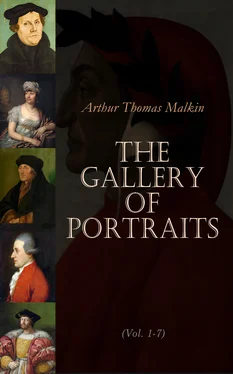While the French theatre was in this state of degradation, Melite appeared. Whatever its faults might be, there was something in it like originality of character; some indications of a comic vein, and some ingenious combinations. The public hailed the new era with delight, and the poet was astonished at his own success. The stage seemed all at once to flourish and to have taken its proper station among the elegant arts and rational amusements. On the strength of this acquisition, a new company of actors was formed; and the successful experiment was followed up by a series of pieces of the same kind, between the years 1632 and 1635. Imperfect as they were, we may trace in them some sketches of new character, which the more methodical and practised dramatists of a later period filled out with more skill and higher colouring, but with little claim to invention.
We owe to Corneille one of the most entertaining personages in modern comedy—the Chambermaid; who has succeeded to the office of the Nurse in the elder drama. This change was partly, perhaps principally, produced by that great revolution in the modern stage which introduced women upon the boards. While female characters were consigned to male representatives, the poet took every opportunity of throwing his heroines into breeches to slur over the awkwardness of the boys; and the subordinate instruments of the plot were duly enveloped in the hoods and flannels of decrepit age, while the hard features of the adult male were easily manufactured into wrinkles. But when once real women were brought forward, they had their own interests to manage as well as those of the author; and the artificial disguise of their persons would ill have accorded with those speculations, of which personal beauty formed a main ingredient. It was their business therefore, while they conducted the love-affairs of their mistresses, to interweave an underplot between themselves and the valets. Less attractive perhaps than their young ladies in outward show, they obtained compensation in the piquancy of wit intrusted to their delivery, and thus divided the interest among the spectators in no disadvantageous proportion.
Corneille was also the first who brought the dialogue of polished society upon the French stage, which had hitherto been confined to the vulgarities of low comedy or the bombast of inflated tragedy. But it is time to rescue him from the obscurity of his own early compositions.
His first tragedy was Medea, copied principally from the faulty model of Seneca, whose prolix declamation, thus early adopted, probably exercised an unfavourable influence on the after fortunes of the national tragedy. His nephew Fontenelle, indeed, says that “he took flight at once, and soared instantly to the sublime.” But this sentence has not been confirmed by more impartial critics. The Continent has condemned the witchcraft; but we are bound to uphold it in defence of our own Shakspeare, who has clothed his hags with more picturesque and awful attributes than the magnificent and imperial sorceries of Corneille, Seneca, or even Euripides himself have exhibited.
The year 1637 was the era of the production of the Cid; the play not only of France, but of Europe, for it has been translated into most languages. But a sudden reputation involves its possessor in many vexations. Poets were in those days compelled to be courtiers, if they would prosper. At the Hotel de Rambouillet, an assembly was held, consisting of courtly and fashionable authors, who wasted their time in composing thèses d’amour and other fopperies of romantic literature. Over this society, as well as over the politics of Europe, Richelieu chose to be umpire. He was also the founder of the French Academy, and the avowed patron of its members. With this hold upon their good manners, he kept four authors in pay, for the purpose of filling out his own dramatic and poetical skeletons. Corneille consented to be one of the party, and was so ignorant of the ways of courts as to fancy that he might exercise his judgment independently. He was even simple enough to be astonished that the well-meant liberty of making some alterations in the plot of one of these ministerial dramas should give offence: but as he was too proud to surrender his own judgment, or to risk future affronts from the revulsion of the Cardinal’s goodwill, he withdrew from the palace, and abandoned himself to uncontrolled intercourse with the Muse. Richelieu therefore became the principal instigator of a cabal, which the envy of the wits sufficiently inclined them to form. Under such auspices, they entered into a conspiracy against the uncourtly offender. The prime minister could not endure that the successful intriguer in political life should be taxed with failure in unravelling the intricacies of a fictitious interest: he therefore looked at the real defects in a performance approved by the public with a jaundiced eye, and with but a half-opened one at its unrivalled beauties. As universal patron, he had settled a pension on the poet; but he levelled insidious and clandestine shafts against his fame. The “irritable tribe” willingly ran to arms, with Scuderi at their head, who wrote hostile remarks on the Cid, addressed to the Academy in the form of an appeal, in the course of which he quaintly termed himself the evangelist of truth . According to the statutes of the Academy, that august body could not take upon itself the decision, without the consent of both parties. Corneille, however indignant professionally, was under too many personal obligations to the Cardinal to spurn the authority of a tribunal erected by him. He therefore gave his assent to the reference, but in terms of considerable haughtiness. The Academy drew up a critique, to which they gave the modest title of “Sentiments of the French Academy on the tragicomedy of the Cid.” In the execution of this delicate commission, the learned members contrived to reconcile the demands of sound taste and criticism with the tact and suppleness of courtiers. They gratified the splenetic temper of the minister by censures, the justice of which could not be gainsayed: but they praised the beauties of the great scenes with a nobleness of panegyric, which took from the author all right to complain of partiality. This solemn judgment was given after five months of debate and negotiation between the Cardinal and the academicians, who dreaded official frowns if they wholly acquitted, and public disgust if they condemned against evidence. If it be considered that this infant institution owed its birth to Richelieu, and depended on him for its future growth, the verdict is highly honourable to the individuals, and creditable to the literary character, even when disadvantageously circumstanced by being entangled in the trammels of a court.
Our limits will not permit the examination of insulated passages, nor even individual tragedies: but independently of the splendour of the execution, other circumstances attending the career of the Cid produced a strong impression on the remainder of Corneille’s dramatic life. The Cid was taken from two Spanish plays, and several passages were actual translations; but not in sufficient number to invalidate the author’s claim to a large share of originality. To set that question at rest, in the editions published by himself, he gave the passages taken from the Spanish at the bottom of the page. Yet it was objected by his rivals and libellers, that the author of Medea and the Cid could only imitate or translate: that he had stolen the first of his tragedies from Seneca, the second from Guillen de Castro: a clever borrower, without a spark of tragic genius or invention! Unluckily for this bold assertion, among other European languages, this French play was translated into Spanish; and the nation, whence the piece was professedly derived, thought it worth while to recover it in the dress given to it by an illustrious foreigner. Against such unfounded censures it will be sufficient to quote the authority of Boileau, who speaks of the Cid as a merveille naissante .
Читать дальше












